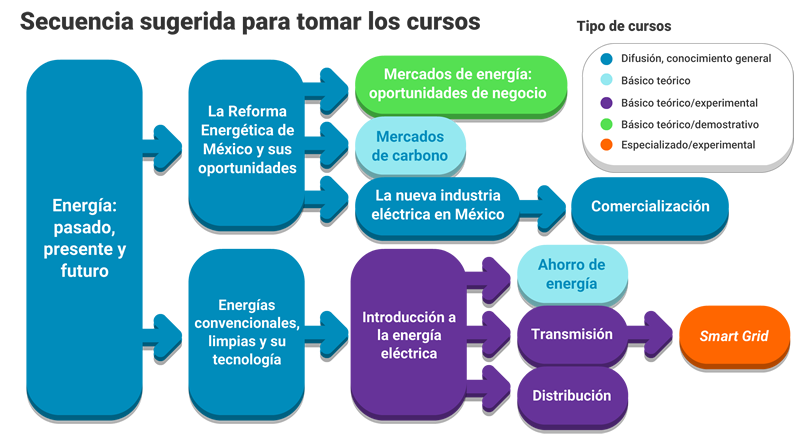Energetic resource is linked to development, welfare, sustainability and independence of modern societies.
The adequate use and administration of the different energetic resources will have an impact in our own progress as well as in the economic power.
It is imperative to know in depth the pros and cons of the different energetic technologies to minimize the negative impact on our own environment when selecting, using, rationalizing, and taking advantage of the energy used for the everyday activities.
Participants will develop competencies in analysis and critical thinking when selecting an energetic resource, building a based and conscious agenda considering the environment and its resources.
Participants will be able to forecast for technologies of energetic production:
- Capacities
- Efficiency and performance
- Indicators of ecologic footprint

Learning Results
After this course, you will be able to:
- Analyze the different ways in which energy manifests in our daily activities and the industry chores taking a stance in favor of diversifying the production of energy.
- Pick an energetic resource after a critical analysis of clean and conventional energy to use, rationalize, and take advantage of local energy.
Datesof the Course
- Release date: September 12, 2016
- Opening date: February 27
- Closing date: April 14
- Delivery of CertificatesApril 28
Course length
- 7 weeks
Estimated effort:
- 5 hours a week
Previous Requirements
- High school level finished or in course
Languages
- Content: Spanish
- Videos: Spanish
- Transcripts: Spanish
Course Level
- Intermediate
Kind of Certification Free
- Gratuito
Course Staff
Jose Luis Lopez Salinas Ph. D.is a professor from Escuela Nacional de Ciencias e Ingenieria del Tecnologico de Monterrey in the programs of Master's and Ph. D. He participates in the Energy and Climate Change focus group. He is a professor at Departamento de Ingenieria Mecanica y de Ingenieria Quimica for the bachellor programs.
He is a researcher SNI-1, his research area covers the flow and transport of components in porous means and colloidal sciende. He has developed technologies for improved recovery of fossil fuels and refrigeration systems for solar energy.
He received his Ph.D. degree from Rice University, his Master's from Tecnologico de Monterrey and his bachellor degree from UANL.
Fields
- Environmental Studies
- Engineering
- Physics
Topics
Topic 1. Energy, its types and classification
- Properties, dimensions, and units
- Classification of energy
- Quantification of energy
- Qualification of energy
Topic 2. Conventional energy
- Generation by coal
- Generation by fossil fuels
- Generation by nuclear energy
- Generation, cogeneration, and trigeneration
Topic 3. Energy storage
- Where and how is it stored?
- Ways to store energy.
- Pumping systems to store hydraulic energy.
- Advantages and disadvantages of storing energy.
Topic 4. Wind and hydraulic energy.
- Physics of the planet
- Direct use of wind energy
- Pros and cons of wind and hydraulic energy
- Wind energy generators
Topic 5. Solar and photovoltaic energy
- Thermic energy
- Photovoltaic cells.
- Passive and Active systems
- Refrigeration systems and air conditioner
Topic 6.Biomass energy
- Biomass classification
- Biogas
- Biodiesel
- Bioethanol
Suggested Sequence

